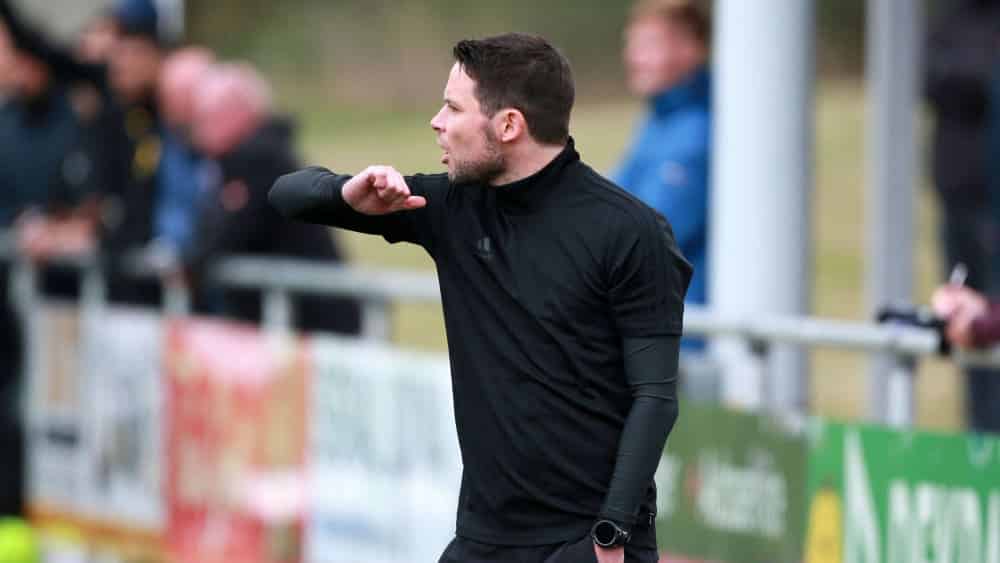Alexander Otto (37) is a coach at Premier League club BC Viktoria Glesch-Paffendorf and is the full-time head of the DFB analysis team at the Sports University in Cologne. A conversation about opponent analysis in the top division, why he seems to be a good coach himself – and what he first acquired at his club.
Mr. Otto, what are the strengths of 1. FC Düren?
Alexander Otto: Nice start (laughs). That’s probably the individual quality, which is of course on a different level at 1. FC Düren than at the rest of the teams in the league.
I’m asking because on the one hand you are the head coach in the Mittelrheinliga, where 1. FC Düren tops the table, but on the other hand you are the full-time project manager of the DFB analysis team (“Spielanalyse-Team Köln”) at the Sports University in Cologne. What exactly do you do there?
We train analysts. It’s a course of study over two years. And in this training, the highlight is the very practical support of the senior national team at the major tournaments.
So you analyse how to play at the World Cup against the next opponent?
We provide our data, but of course the main work lies with the DFB team. We are a supporting factor for Dr. Stephan Nopp.
What does analysis mean exactly? Can you give us a little insight into the system behind it?
Match analysis in Germany has grown and developed over the Lehmann note at the 2006 World Cup. There are different areas of analysis, including individual player analyses, team analyses and standard situation analyses. There are also various analysis tools. Basically, the question always arises: which information is relevant in which situations?
After you have done your work on the TV screen, can you also determine whether it has actually been incorporated?
There are obvious aspects, such as the behaviour of individual players or the behaviour in the tactical systems, which can be identified very well. With more specific analyses in the area of opponent preparation, you might not be able to see the strength of the opponent – and thus you would only see the consequence of the analysis.
Because it is a topic that is always wafting in the background: What role does artificial intelligence (AI) currently play in education?
This is of course a highly exciting topic. The problem with football is that it is an incredibly complex game. The process of developing AI is still taking a while. It is not currently applied in our education. We teach in qualitative analysis – of course, quantitative analysis always plays a part.
Let’s take a thematic branch: How important is opponent analysis in the premier league?
For me personally it is very important. The first thing I did when I started in Glesch: We bought a new camera system, because of course we want to use what skills we are building up here.
This widespread system, which likes to swing away before the goal is scored in order to film the pigeon in the orphaned penalty area opposite?
No, we work with a system where there is also the possibility to see the complete pitch. It is much more important for us not only to see what is happening close to the ball.
How deep does the analysis go? Do you approach it differently than when you analyse national teams?
Of course, you have to break the whole thing down to the premier league. But we do both post-match analyses and match preparation, because I think that’s important information for team tactics, which you can use to annoy individually stronger teams. We approach it the same way.
You get the impression that the further down you go in the leagues, the greater factors such as chance or individual class become. How do you see that?
I also believe that the individual quality factor is a big one in the top division. You can see that in our league as well. But I also believe that the higher the individual quality, the better you can work tactically with the players.
When you look at your fellow coaches: Do they work tactically in detail in the Mittelrheinliga?
(thinking about it) I can’t really judge that.
A good analyst is not necessarily a good coach. What is the most important skill that you can’t learn on the screen?
People management is the be-all and end-all for a good coach. And it doesn’t matter what tactical qualities you can deliver if you don’t get the whole thing across to the players with your social skills. Then it’s of no use at all.
Are you a good coach yourself?
That’s for others to judge. In any case, I enjoy it very much. And if you look at where I started with Glesch – last in the Landesliga – and now we’re playing a good role in the Oberliga, then I would see it purely based on data.
And where do you yourself see your future? In the front row or as a data analyst in the extended circle behind it?
Those are two different aspects: The support work in the analysis area on the one hand, and being in the front row on the other, but they complement each other quite well. Let’s see where the journey goes.





